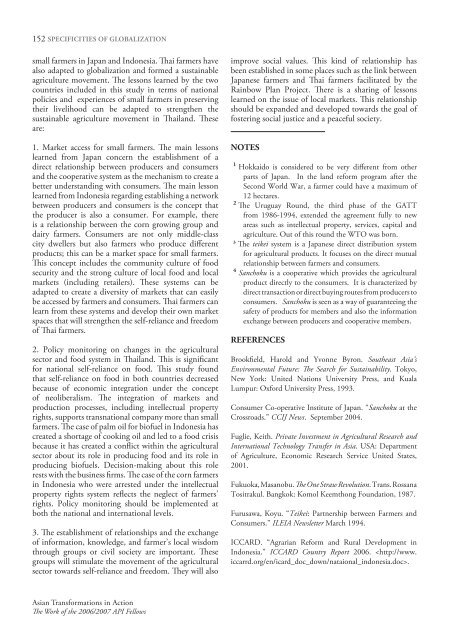Asian Transformations in Action - Api-fellowships.org
Asian Transformations in Action - Api-fellowships.org
Asian Transformations in Action - Api-fellowships.org
Create successful ePaper yourself
Turn your PDF publications into a flip-book with our unique Google optimized e-Paper software.
152 SPECIFICITIES OF GLOBALIZATIONsmall farmers <strong>in</strong> Japan and Indonesia. Thai farmers havealso adapted to globalization and formed a susta<strong>in</strong>ableagriculture movement. The lessons learned by the twocountries <strong>in</strong>cluded <strong>in</strong> this study <strong>in</strong> terms of nationalpolicies and experiences of small farmers <strong>in</strong> preserv<strong>in</strong>gtheir livelihood can be adapted to strengthen thesusta<strong>in</strong>able agriculture movement <strong>in</strong> Thailand. Theseare:1. Market access for small farmers. The ma<strong>in</strong> lessonslearned from Japan concern the establishment of adirect relationship between producers and consumersand the cooperative system as the mechanism to create abetter understand<strong>in</strong>g with consumers. The ma<strong>in</strong> lessonlearned from Indonesia regard<strong>in</strong>g establish<strong>in</strong>g a networkbetween producers and consumers is the concept thatthe producer is also a consumer. For example, thereis a relationship between the corn grow<strong>in</strong>g group anddairy farmers. Consumers are not only middle-classcity dwellers but also farmers who produce differentproducts; this can be a market space for small farmers.This concept <strong>in</strong>cludes the community culture of foodsecurity and the strong culture of local food and localmarkets (<strong>in</strong>clud<strong>in</strong>g retailers). These systems can beadapted to create a diversity of markets that can easilybe accessed by farmers and consumers. Thai farmers canlearn from these systems and develop their own marketspaces that will strengthen the self-reliance and freedomof Thai farmers.2. Policy monitor<strong>in</strong>g on changes <strong>in</strong> the agriculturalsector and food system <strong>in</strong> Thailand. This is significantfor national self-reliance on food. This study foundthat self-reliance on food <strong>in</strong> both countries decreasedbecause of economic <strong>in</strong>tegration under the conceptof neoliberalism. The <strong>in</strong>tegration of markets andproduction processes, <strong>in</strong>clud<strong>in</strong>g <strong>in</strong>tellectual propertyrights, supports transnational company more than smallfarmers. The case of palm oil for biofuel <strong>in</strong> Indonesia hascreated a shortage of cook<strong>in</strong>g oil and led to a food crisisbecause it has created a conflict with<strong>in</strong> the agriculturalsector about its role <strong>in</strong> produc<strong>in</strong>g food and its role <strong>in</strong>produc<strong>in</strong>g biofuels. Decision-mak<strong>in</strong>g about this rolerests with the bus<strong>in</strong>ess firms. The case of the corn farmers<strong>in</strong> Indonesia who were arrested under the <strong>in</strong>tellectualproperty rights system reflects the neglect of farmers’rights. Policy monitor<strong>in</strong>g should be implemented atboth the national and <strong>in</strong>ternational levels.3. The establishment of relationships and the exchangeof <strong>in</strong>formation, knowledge, and farmer’s local wisdomthrough groups or civil society are important. Thesegroups will stimulate the movement of the agriculturalsector towards self-reliance and freedom. They will alsoimprove social values. This k<strong>in</strong>d of relationship hasbeen established <strong>in</strong> some places such as the l<strong>in</strong>k betweenJapanese farmers and Thai farmers facilitated by theRa<strong>in</strong>bow Plan Project. There is a shar<strong>in</strong>g of lessonslearned on the issue of local markets. This relationshipshould be expanded and developed towards the goal offoster<strong>in</strong>g social justice and a peaceful society.NOTES1 Hokkaido is considered to be very different from otherparts of Japan. In the land reform program after theSecond World War, a farmer could have a maximum of12 hectares.2 The Uruguay Round, the third phase of the GATTfrom 1986-1994, extended the agreement fully to newareas such as <strong>in</strong>tellectual property, services, capital andagriculture. Out of this round the WTO was born.3The teikei system is a Japanese direct distribution systemfor agricultural products. It focuses on the direct mutualrelationship between farmers and consumers.4 Sanchoku is a cooperative which provides the agriculturalproduct directly to the consumers. It is characterized bydirect transaction or direct buy<strong>in</strong>g routes from producers toconsumers. Sanchoku is seen as a way of guarantee<strong>in</strong>g thesafety of products for members and also the <strong>in</strong>formationexchange between producers and cooperative members.REFERENCESBrookfield, Harold and Yvonne Byron. Southeast Asia’sEnvironmental Future: The Search for Susta<strong>in</strong>ability. Tokyo,New York: United Nations University Press, and KualaLumpur: Oxford University Press, 1993.Consumer Co-operative Institute of Japan. “Sanchoku at theCrossroads.” CCIJ News. September 2004.Fuglie, Keith. Private Investment <strong>in</strong> Agricultural Research andInternational Technology Transfer <strong>in</strong> Asia. USA: Departmentof Agriculture, Economic Research Service United States,2001.Fukuoka, Masanobu. The One Straw Revolution. Trans. RossanaTositrakul. Bangkok: Komol Keemthong Foundation, 1987.Furusawa, Koyu. “Teikei: Partnership between Farmers andConsumers.” ILEIA Newsletter March 1994.ICCARD. “Agrarian Reform and Rural Development <strong>in</strong>Indonesia.” ICCARD Country Report 2006. .<strong>Asian</strong> <strong>Transformations</strong> <strong>in</strong> <strong>Action</strong>The Work of the 2006/2007 API Fellows
















